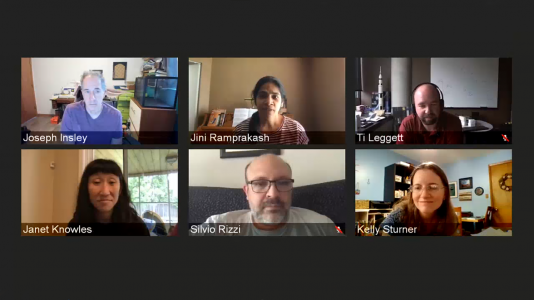High school students demonstrate creative ingenuity in Argonne’s 2020 virtual Coding for Science Summer Camp

From July 13-17, 2020, 27 high school students got to experience the U.S. Department of Energy’s (DOE) Argonne National Laboratory’s vibrant science, technology, engineering and mathematics (STEM) community through its first virtual Coding for Science Camp, which developed participants’ coding skills through creative challenges. The event was a collaboration between Argonne’s Educational Programs group and the Argonne Leadership Computing Facility (ALCF), a DOE Office of Science user facility.
“Through coding activities, students learn important programming skills in Python and see how they can apply them to the real world,” explained Kelly Sturner, Learning Lab instructor at Argonne’s Learning Center. “These camps are very hands-on, and we had to rethink what interactive learning looks like in a completely virtual environment. Science as a context for learning coding lends itself well to virtual learning. It was great to see how well the students adjusted to this new approach and how much they learned.”
“We’re incredibly grateful to the volunteers from across Argonne who help deliver a once in a lifetime learning experience for our students. The virtual environment has created a unique opportunity this summer for youth to discover and advance their STEM potential.” — Kelly Sturner, Learning Center instructor
In addition to participating in virtual activities to learn coding techniques, students had the opportunity to virtually visit the ALCF. The tour included stops at the ALCF’s data center and visualization lab.
“Touring Argonne’s one-of-a-kind facilities gives students a taste of what it’s like to be part of a national laboratory, so I’m happy we could recreate the experience virtually,” said ALCF Deputy Division Director Jini Ramprakash. “We were able to give the students a glimpse into the amazing science enabled by supercomputers and the work it takes to prepare our data center for the lab’s upcoming exascale system, Aurora.”
In previous years, students programmed robots for the camp and sent them through a maze. Since this was not possible in a virtual environment, the students instead worked in teams on their own unique coding projects. They designed many remarkable programs, from making an interactive AI chatbot to creating unique melodies from a combination of different music libraries. “The students knocked it out of the park with their projects, and we were all really impressed,” Sturner shared afterward.
The students greatly enjoyed the summer camp experience and gave lots of great feedback. “The speakers were really interesting to listen to! It really gave me a bunch of different perspectives of different jobs at Argonne,” one student shared.
Many students especially liked the challenge of the final coding projects. “I loved the freedom that we got to make the programs, and I learned a lot about using libraries and how much stuff is really out there,” another student said.
The success of Coding for Science Camp and other virtual summer programs at Argonne stems from the lab’s volunteer community. Twenty-seven Argonne employees from 11 different divisions across the lab volunteered, assisting as instructors, coding helpers, panelists, virtual tour guides and guest speakers.
“We’re incredibly grateful to the volunteers from across Argonne who help deliver a once in a lifetime learning experience for our students,” said Sturner. “The virtual environment has created a unique opportunity this summer for youth to discover and advance their STEM potential.”
This work was supported in part by the U.S. Department of Energy, Office of Science, Office of Workforce Development for Teachers and Scientists (WDTS).
About Argonne Educational Programs and Outreach
Argonne’s Educational Programs and Outreach — through awe-inspiring learning experiences, exciting programs, and active outreach —welcomes every middle school, high school, undergraduate and graduate student to join the Argonne community. Argonne’s Educational Programs invite students on new pathways, inspire connections and introduce a diverse new generation of STEM (science, technology, engineering and mathematics) game-changers to world-class science. At Argonne, students are exposed to key concepts through interactive programming, are challenged to develop innovative solutions that reflect professional scientific research practices and are engaged in real-world problem-solving to show how they can apply their skills to shape their futures in the world. Argonne scientists who participate in Argonne Educational Programs and Outreach build positive connections with individual students to foster science identities and bring out the best in their potentials. Argonne Education connects with over 30,000 youth and families at Outreach events, hosts over 4,400 middle and high school students at the Learning Center and employs over 900 undergraduate and graduate students each year.
The Argonne Leadership Computing Facility provides supercomputing capabilities to the scientific and engineering community to advance fundamental discovery and understanding in a broad range of disciplines. Supported by the U.S. Department of Energy’s (DOE’s) Office of Science, Advanced Scientific Computing Research (ASCR) program, the ALCF is one of two DOE Leadership Computing Facilities in the nation dedicated to open science.
Argonne National Laboratory seeks solutions to pressing national problems in science and technology. The nation’s first national laboratory, Argonne conducts leading-edge basic and applied scientific research in virtually every scientific discipline. Argonne researchers work closely with researchers from hundreds of companies, universities, and federal, state and municipal agencies to help them solve their specific problems, advance America’s scientific leadership and prepare the nation for a better future. With employees from more than 60 nations, Argonne is managed by UChicago Argonne, LLC for the U.S. Department of Energy’s Office of Science.
The U.S. Department of Energy’s Office of Science is the single largest supporter of basic research in the physical sciences in the United States and is working to address some of the most pressing challenges of our time. For more information, visit https://energy.gov/science.
